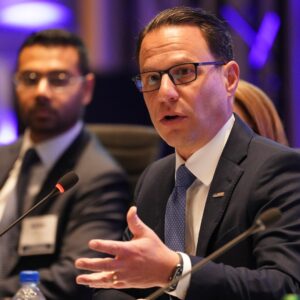
The fourth and final roundtable of the National Governors Association 2022-2023 Chair’s Initiative on Strengthening Youth Mental Health was held in Philadelphia, Pennsylvania, on May 18, 2023. NGA Chair New Jersey Governor Phil Murphy and First Lady Tammy Murphy were joined by Pennsylvania Governor Josh Shapiro and First Lady Lori Shapiro, Delaware Governor John Carney and state representatives from Louisiana, New Jersey, Pennsylvania, and Virginia. Conversation centered on the role states can play to enable and equip a wide range of caregivers and educators with training and tools to support youth mental health. The roundtable opened with a conversation with Goldie Hawn, Academy Award winning actress and founder and CEO of the Hawn Foundation. The Hawn Foundation’s signature program, MindUP, aims to help children and their families better understand the brain science behind resiliency and develop tools to manage emotions and stress. Ms. Hawn spoke on the importance of teaching youth that they can have agency over their mental health and providing them the tools to do so.
Expanding the Village: Educator and Community Training and Support
Over the course of their daily lives, young people are in regular contact with adults and mentors outside their families who can play a critical role in their mental health. This village is often comprised of educators, given the frequency of interaction with their students, in addition to other community voices like faith leaders, sports coaches and afterschool leaders who have regular contact and connection with youth. This village can be critical in promoting mental wellness in the youth they serve and supplement or complement the influence of clinical care. However, many leaders in education and community systems report feeling underprepared, under-resourced or ill-equipped to engage in this space. According to Effective School Solutions, only 40% of school administrators said they felt highly confident to tackle mental health challenges, and this statistic is likely to be lower outside of school environments. To expand the village, Governors and state leaders can implement policies and programs to:

- Offer culturally competent trainings for a range of school staff and youth-facing adults on how to identify and respond to risk factors and warning signs of earlier mental health and substance use disorders
- Build awareness around available care and resources for youth facing adults
- Implement trauma-informed and culturally competent approaches within spaces like schools, after-school organizations, extra-curricular activities and sports teams
- Coordinate sustainable funding for school-based mental health supports, including leveraging federal funds, such as Medicaid
- Create evidence-based guidance and standards for the design and implementation of youth mental health services within schools, using multi-tiered systems of support (MTSS) as a framework
- Support educators’ ability to address their own mental health challenges and avoid burnout by investing in mental health resources and benefits for staff members
- Ensure faith leaders, out-of-school programs, sports coaches and other youth-facing adults have a voice in policymaking conversations
- Create relationships with and elevate the voices of “wellness champions” within faith-based and other communities
- Incorporate youth peer support models by creating youth peer support specialist certifications and adding-on youth and young adult training for current certified peer support specialists who support young people
- Grow the school mental health workforce by implementing licensing changes to target key shortages and introducing or expanding school mental health professional pipeline programs
Caring for the Caregivers

Strengthening youth mental health can begin at, or before birth. A 2016 study by the Centers for Disease Control and Prevention states that 1 in 6 children aged 2-8 years had a diagnosed mental, behavioral or developmental disorder. The statistic worsens within underserved populations, with the number rising to 1 in 5 for children living below the federal poverty level. Due to the siloed systems of services today, parents are often expected to “quarterback” the care team, forging new care pathways and advocating on behalf of their children with very little assistance. Parents and guardians need help navigating the mental health care system on behalf of their children. Parents and caregivers may also struggle with their own mental health, and these challenges may impair their ability to coordinate effectively for their child to receive care. States can empower caregivers by:
- Dedicating funding for trusted, community-based organizations that offer parent and caregiver peer support programs
- Creating regional task forces to address workforce incentives and collaboration with community providers
- Upholding the testimony of caregivers and including their expertise and experiences in policymaking conversations
- Reducing administrative barriers within state systems to support whole-child and whole-family treatment approaches that include parental mental health care and peer supports
- Engaging youth in leadership positions, such as a Governor’s Commission or advisory boards that have authority to address issues important to youth and provide recommendations directly to the Governor and leaders in the agencies
- Maximizing regulatory flexibilities, available technology and licensing changes to enable tele-mental health care to lessen logistical burdens for families
- Developing a comprehensive system of care that offers wraparound supports for youth and families with complex needs and respite care to reduce caregiver burnout
- Explore including system navigation, peer supports and caregiver resources in Medicaid managed care contracts
Since October 2022, Governor Murphy has hosted four Chair’s Initiative roundtable discussions in Utah, California, Michigan and Pennsylvania. The insight from these roundtables, supplemented by learning calls with partners and thought leaders, will be incorporated into a written Playbook for Governors focused on actionable ways to improve youth mental health. The playbook will help Governors and state policymakers understand the policy levers at their disposal and amplify emerging best practices and innovative state programs across the country. Governor Murphy and the National Governors Association will release the playbook at the 2023 NGA Annual Meeting scheduled to take place in July 2023.













